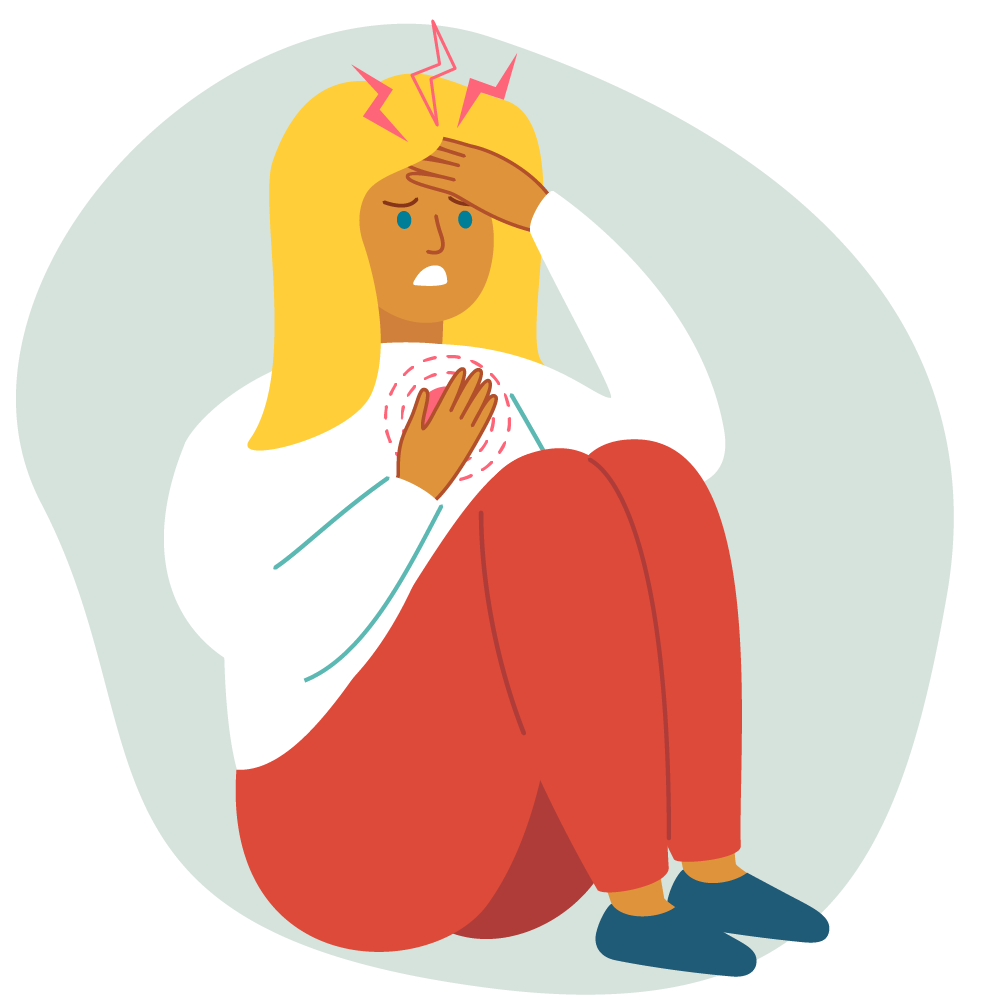Anxiety Therapy near Marietta, Roswell & Atlanta
We offer evidence-based treatment for Anxiety, Obsessive Compulsive Disorder (OCD), and Perfectionism to help you experience more peace with less effort.


Has Your Anxiety Gotten Out of Control?
- Do you catch yourself spending more time worrying than actually enjoying life?
- Are the high expectations you place on yourself draining you of energy, enjoyment, and satisfaction?
- As you struggle to maintain balance and keep all the balls in the air, have you become increasingly stressed out and unable to relax?
Although the function of anxiety is to protect you from potential threats, there may be times when it goes into overdrive. You might fixate on small things, like a problem at work or a text from a friend that made you wonder if they’re mad at you. But as soon as one thought recedes, you’ve moved on to worrying about something else. Much like playing a game of whack-a-mole that never stops, you become increasingly overwhelmed as your brain bounces from one anxious thought to the next.
Anxiety And OCD Can Manifest In Different Ways
Maybe you notice that you:
- Feel restless and edgy, making it difficult to relax;
- Become agitated whenever something doesn’t go exactly to plan;
- Avoid situations or places, such as attending social gatherings, driving in congested areas, or visiting crowded locations;
- Can’t fall asleep or stay asleep at night;
- Tend to overanalyze situations by either dwelling on the past, or dreading the future;
- Experience physical symptoms, such as tense muscles, sweating, and racing heartbeat that sometimes culminate into panic attacks;
- Ruminate over troubling thoughts that make you anxious and then feel compelled to perform certain actions to reduce the anxiety.
- Constantly monitor and seek reassurance about your health from others or through repeated medical consultations.
Anxiety and OCD can negatively impact all aspects of your life, including your work performance, social life, relationships, and self-esteem. Although avoiding the situations that stress you out may help temporarily, using avoidance as your go-to coping mechanism can make anxiety worse while also causing you to miss out on the things you enjoy.
Fortunately, therapy offers effective treatments for anxiety and Obsessive-Compulsive Disorder (OCD). With evidence-based interventions like Cognitive Behavioral Therapy (CBT) and Exposure and Response Prevention (ERP), you can find helpful solutions for anxiety that provide relief. Our therapists treat all different types of anxiety, including Generalized Anxiety, Obsessive-Compulsive Disorder (OCD), Social Anxiety, Phobias, Panic Attacks, and Health Anxiety.
Contact Us
Have a question? Feel free to reach out to us using our contact form.
Anxiety Is A Worldwide Mental Health Issue
Anxiety is the most widespread mental health challenge we face on the planet. The World Health Organization (WHO) reports that “anxiety disorders are the world’s most common mental disorders, affecting 301 million people in 2019.” [1]

No matter what stage of life we are in, we face stressors that often exacerbate anxiety. As young adults, we struggle to establish careers and gain independence. When we get older, we may have difficulty keeping up with the demands of daily life and establishing a healthy work-life balance. With so many financial, professional, and familial obligations hanging over us, it’s easy to get overwhelmed and emotionally exhausted by the end of the day.
Living in a fast-paced society that values money and success over relaxation, connection, and self-care is a big reason why anxiety is so prevalent. Being raised to believe that our self-worth equates to our achievements often instills perfectionistic tendencies from an early age. In particular, women often feel pressure to excel within their careers while simultaneously fulfilling their roles as partners and parents flawlessly.
We Don’t Know How To Deal With Anxiety
Most of us were never taught how to manage anxiety. Instead of learning ways to sit with our anxious feelings, we try to run away from them, which only makes anxiety more difficult to deal with. Because we are wired for anxiety as a means of human survival, the goal should never be to eliminate it completely. However, learning healthier ways to decrease its debilitating symptoms can help us manage anxiety more effectively.
If an anxiety disorder or OCD negatively impacts your life, counseling can provide you with the skills to reduce intrusive thoughts and compulsive behaviors to restore a healthier balance.

The Good News Is You Don't Have To Face This Alone—Anxiety Therapy Can Help
Although you may conclude that you’re feeling anxious for no particular reason, what’s more likely is that you don’t recognize what the reason actually is. For example, perhaps you had a harshly critical parent growing up who instilled the belief that you always had to be perfect. Or maybe you experienced an event that was physically or emotionally traumatic but, instead of acknowledging it as trauma, you accepted what happened as “normal.”
Whatever your concern is—whether it’s panic attacks, social anxiety, perfectionism, people-pleasing, or OCD—therapy can help you figure out the cause and then provide you with treatment and tools that help you live with anxiety without being plagued by it. Our anxiety disorder specialists can show you how to respond to your emotions in a new way. We offer a safe, empathetic, and compassionate space to lay down the burden of anxiety. In therapy, you can break free from the cycle of anxious thoughts, self-doubt, and avoidance to find a new path forward.
Imagine if you could…

- Reduce self-criticism and self-doubt;
- Feel confident when confronting people and situations you once shied away from;
- Discover strategies to remain composed in high-stress situations at work or in academic environments;
- Experience improved sleep quality, reduced muscle tension, and fewer physical symptoms;
- Live more in the present and less in your thoughts;
- Approach the future with increased courage, clarity, and optimism.
The Modalities We Use In Anxiety And OCD Treatment
We use evidence-based approaches for treating anxiety, including Cognitive Behavioral Therapy (CBT), Exposure and Response Prevention (ERP), Dialectical Behavior Therapy (DBT), Brainspotting, Solutions-Focused Brief Therapy (SFBT), and Mindfulness-Based Therapy. For instance, with CBT, you will gain awareness of how your thoughts and core beliefs impact how you feel and behave. By monitoring your thoughts, you will learn how to reframe or replace negative thoughts that contribute to self-criticism, anxiety, and depression. With ERP, we utilize exposure protocols to gently expose you to the thoughts that are making you anxious, with the ultimate goal of reducing the anxiety and breaking the OCD loop.
Working with a therapist, you will learn how to tolerate challenging thoughts and emotions and problem-solve more effectively, helping you finally stop the endless cycle of worry and paralysis caused by anxiety. With new skills in hand, you will be equipped to cope with anxiety, restoring peace and enjoyment in your life.
But Maybe You’re Not Sure If Anxiety Therapy Is Right For You…
When you suffer from anxiety, it’s difficult to recognize your blind spots. That’s why working with a counselor is so beneficial—they bring an outside perspective into therapy and notice things about your anxiety you probably overlooked. In addition, a therapist is trained to help you alleviate your symptoms so anxiety is no longer controlling your life. Whether you are dealing with social anxiety, OCD, perfectionism, or people-pleasing, therapy can target what you struggle with and help you find solutions.
Focusing on your mental health is an investment that will pay off throughout your lifetime. After all, it’s hard to put a price on your emotional well-being. What’s more, therapy can help you develop greater self-confidence and assertiveness, valuable attributes in the workplace that can lead to more career growth and financial advancement.
Unlike a psychiatrist who is a medical doctor credentialed to prescribe anxiety medication, the therapists at Awaken Counseling specialize in psychotherapy treatment options. However, research shows that psychotherapy can be just as effective as medication for treating anxiety. [2] Although many people opt for therapy instead of medication, others find that combining the two can be an effective way to treat anxiety. If you are curious about medication, we recommend you consult with your primary care provider, or we can refer you to a psychiatrist.
Getting Treatment For Anxiety And OCD Can Be Life-Changing
With a variety of evidence-based modalities available, there is no reason to hold off receiving anxiety treatment any longer. If you would like to find out more about anxiety or OCD therapy with Awaken Counseling, you can click here to schedule a free 15-minute call.



